#rsl looks nice in it though whatever
Explore tagged Tumblr posts
Text
see. okay so i genuinely forgot how boring married to it is and i forgot i only watch it for rsl. i genuinely don’t like that movie i just like chuck bishop sigh
#the plot is so BORING#sigh#also.#the excessive sex scenes??? like LEAVE ME ALOUGHN#not my fav thing i fear.#rsl looks nice in it though whatever#there’s a special tag for today!#neil’s sick day#i’m gonna be rambling a lot sigh
29 notes
·
View notes
Text
It’s from a book called ‘conversation in the wings’ by Roy Harris; it’s a transcript of the interviews he had with actors and this is the section of rsl.
Just a warning it’s quite long.
(Source)
________________________________________
1994: CONVERSATIONS IN THE WINGS
The Author's Intentions Are Good
by Roy Harris
Conversations in the Wings
1994
This interview took place on Friday, May 24, 1991, on the Mainstage at Playwrights Horizons where Jon Robin Baitz's The Substance of Fire was playing. Considering that he is the youngest person who talks here about acting (he was 22 at the time of the interview), it is remarkable that Robert Sean Leonard speaks with so much ease and apparent knowledge on a subject that can be as elusive as this one. The clarity he has as he discusses how he works on a role is not unlike the focus he brings to the characters he creates on stage. At the time of this interview, Mr. Leonard had recently finished a run of Romeo and Juliet for the Riverside Shakespeare Company.
Roy Harris: So let's start at the beginning. If you get a script and you read it and say to yourself, "I've got to do this," what makes you feel that?
Robert Sean Leonard: Well, that's hard to say. It depends on if you're reading for a certain character-I mean, if you're not sure who you're going to play yet. I guess I read specifically for the author's intentions of the play.
Roy Harris: Do you ever take a role-maybe it's not so wonderful-to be a part of that writer's particular world?
Robert Sean Leonard: Oh, yes. But if the play is important to you and that moving to you, then a small role becomes important because of what the author's saying. I'll be doing Our Town in London this fall and early winter. George is a very nice, I thought, young juvenile role to do. But then I read the play again, and I was astonished at the simplicity and importance of Wilder's message. Suddenly, George became much more important to me. I realized his place in that world, and it was big. If you look at the play, no one talks to each other. Except for the soda fountain scene. And there they talk. That's why they get married. Seeing this made playing him exciting. The way George has to deal with life and death is amazing.
Roy Harris: When you decided to do, for instance, the Greek pianist Alexandros in When She Danced, what made you make that decision?
Robert Sean Leonard: Joanne Woodward told me I had to do it.
Roy Harris: That's a good reason; she's very smart.
Robert Sean Leonard: Well, that play defined the undefinable qualities and questions about what I do as an actor. And I'd never seen that in a play before. So, I guess it was both things: the play itself and what a wonderful character.
Roy Harris: When you were working on Alexandros, what did you find the most challenging thing about it?
Robert Sean Leonard: Oh, come on, Roy, you remember?
Roy Harris: Well, I have to ask you now as if I weren't there. I'm an impersonal interviewer now.
Robert Sean Leonard: His incredible self-confidence. The guy walks into a room and you look at him. I've never been able to do that. I've seen other people who have that. And, it's not a quality you can play. It's not like an accent. It's a within quality. And you're in awe of it when you see it.
Roy Harris: Well, you have a quality as an actor of self-effacement. Do you think you had to get past that, go beyond it in some way?
Robert Sean Leonard: Oh, yes, but what a time I had working on it. It was a breakthrough for me. Sitting at that piano, standing up and saying, essentially, "I am a prodigy." I would say it in the mirror at home and I couldn't do it. It goes against everything you try to be as a human, as an actor. To never assume you know because then you'll stop growing. That was completely foreign to me.
Roy Harris: Did you feel you were the right choice for the role?
Robert Sean Leonard: Oh, yes.
Roy Harris: Me, too. It has to do with the other quality we talked about: something reserved and thoughtful. If you don't have that, then the sureness of Alexandros will be obnoxious.
Robert Sean Leonard: What was fascinating for me: to have an amazing bravura, and at the same time, as Quixote says, to have the humility to "love pure and chaste from afar." To love purely requires a lot of humility. It goes against the bravura. With Alexandros, I had the humility, but as you know, it took weeks and weeks to get the right assertiveness.
Roy Harris: It was fascinating watching it happen. All right, let's back up a minute. You got that role a couple of weeks, at least, before we started rehearsal. What sort of work did you do, if any, before the first day of rehearsal?
Robert Sean Leonard: Well, the bravura element didn't even occur to me until I started saying the words out loud in rehearsal with the likes of Marcia Jean Kurtz, Elizabeth Ashley and Jonathan Walker all sitting there watching me. Actually, the thing I dove right into was the Greek accent. That sort of gives you a center. It's a tangible task. And you have to accomplish it in a certain amount of time. The accent gives you a guideline. You go to the dialect coach and you sit down and start. "No," he says, "the A is pronounced this way. It's always pronounced this way." It was so refreshing to have a guideline as your beginning point. Otherwise, where do you start?
Roy Harris: Did the actual pronunciation of particular words tell you anything about who the person was?
Robert Sean Leonard: I would say the rhythm of it more than the pronunciation of it. The clipped musical rhythm gave me a sense of his spontaneous movement, his vital energy. There's a snappiness to Alexandros, which I really don't have as a person. Something happens to you when you get to have that snappy, clipped musical speech coming out of your mouth. You change inside.
Roy Harris: Let's say it's Thursday night and tomorrow you're going to work on the scene where you introduce yourself to the translator, Belzer. What sort of ordinary, basic work do you do on the scene?
Robert Sean Leonard: You know, the first time this ever came up was when I was doing Beachhouse with George Grizzard. I was sixteen. I was up there one day doing it, you know, just doing it, and Melvin Bernhard the director said, "What are you doing here? What is this about?" And I had no clue. I was just asking my dad where the letter was. Well, he said, "Do you have any assumptions about it? Who's it from? Is it from your mother? If so, what would that mean to you?" When I went home that night, I wanted to quit the business. I cried. And to this day, it's always an obsession of mine-not getting general and relying on some phony charm. What I want to do is get specific and ask myself the necessary questions: what is his intention here? what's he after? why? So, to answer your question, I read the scene, trying to pick out where they're starting, where they're heading, and how they got there. If something changes, where does it change? However, I usually find out more in rehearsal than at home.
Roy Harris: Sometimes, do you find after a rehearsal or a series of rehearsals on a particular scene that there's more there?
Robert Sean Leonard: Oh, sure. The more you work, the more you find. You can be hitting your head against a wall, as I was with Alexandros, and the director can say, "It's because you're not as confident as he is." Like any trouble you have, once you define it, it's so much easier to deal with. Then you know what you're after.
Roy Harris: Do you try to look and see an intention in every line, or a basic intention in a scene?
Robert Sean Leonard: I'm sure that you should, but I've found that there's a level of subconscious work that goes on. I find that it's much better for me to find out what's there with the person in rehearsal. It doesn't mean I don't I really think about it before though.
Roy Harris: Would you say-I'm asking a loaded question now-that you are more an instinctive actor or one more given to plan?
Robert Sean Leonard: I think I'm more instinctive than planned, but both, I guess.
Roy Harris: From having watched you in two different rehearsal situations, I'd say you seem to have done a lot of work when you came in.
Robert Sean Leonard: I would say that's basically true. But there are all sorts of ways of being prepared. For instance, take Romeo. My God, I spent hours just finding out what all those words mean. And then, with Shakespeare, it's so maddening because one thought can mean many different things. You don't have to choose one. Another form of preparation is just knowing your character so well-the background you've come to through what the playwright made up-that when something comes up, you instinctively know what's wrong or right.
Roy Harris: When you re working on a role, do you ever get a picture of what the character should look like?
Robert Sean Leonard: Yeah, and it's never me!
Roy Harris: Well, it shouldn't be you. You're playing somebody else.
Robert Sean Leonard: But I never get that out of my head. I can think back on every role I've done and picture who should have played it instead of me-what type of person; what he looked like.
Roy Harris: Does it help you to do that?
Robert Sean Leonard: Sometimes. Slowly the picture in your mind becomes you. I can look back now and say, yes, I'm Eugene Jerome. Yes, I'm Romeo. But it took a while for me to get there, to get me in the picture. It was always someone else.
Roy Harris: When you're working on a role, do you ever get a sense of how that character should dress?
Robert Sean Leonard: Actually, not much. I know there are actors who do. I guess it doesn't matter so much. I just had a problem with that on The Speed of Darkness, however. The designer was very intent on including the actors in her plans. I drove her crazy. "I don't know. Why are you asking me? Whatever you put on me, I can justify." She didn't like that. But I guess it would depend on the role. The only battle I lost was she put a letter jacket on me, a varsity letter jacket. It was the only thing I didn't like. Any time I see a varsity jacket on stage, I think, 'Oh, here comes a young actor.' I want to be a person. It's too much a sign to me. But I ended up wearing it. She liked it too much.
Roy Harris: When you're in rehearsal, what are you looking for from other actors?
Robert Sean Leonard: Well, hopefully we'll all be pretty solid in our agreement about what is going on in this play and what our part in it is. Of course, there are technical things: like you don't upstage someone when they're talking. An important thing is knowing when the scene is moving, and knowing when it's time to take a moment for yourself. And that's hard. A lot of actors get up there, and understandably, the play is about them. If you're playing a milkman, the play is about a milkman. But when that becomes your only reality, you lose sight of the intentions of the play. You know, it's so obvious to me when an actor feels he is the most important thing in the play. It's so portentous. Every line means something. It's so boring. Maybe that's why I'm a little afraid of finding intentions in every line. Then it all gets too much meaning.
Roy Harris: Have you ever worked with an actor-you don't have to give a name-whom you had a problem with?
Robert Sean Leonard: Sure. I worked with an actress in a film who had no clue, didn't know the first thing about acting. The camera would go to you, and she'd be off camera reading her next film. She would say her lines not looking at you. That drove me crazy. On stage, I must say I've never worked with anyone where there was a problem. I've worked with people who really snapped with me and then people who were just all right to work with.
Roy Harris: Who is an actor you've really liked working with?
Robert Sean Leonard: Cynthia Nixon - when you work with her, she's so in tune with what's going on. When a scene is playing, it just lifts and rises. She's like a dancer. I love all her work. Something happens when that actress walks on stage. It elevates into another world.
Roy Harris: What are you looking for from the director?
Robert Sean Leonard: An unshakable vision. You know when they have it, because you'll ask questions and immediately there's an answer that makes sense, and it makes sense in relation to everything that's happened so far.
Roy Harris: What if it's a vision you don't agree with?
Robert Sean Leonard: That doesn't matter. I want a vision that's like a force running through everything.
Roy Harris: What happens when there's not a vision?
Robert Sean Leonard: Well, my sister told me once, when she was in third grade, her whole class went into the city. When they came up from the subway, the teacher-for a moment-didn't know where she was. My sister saw that look, and suddenly was terrified. She lost all faith. And that's horrible when it happens with a director, and it can happen in an instant. If they have an unshakable vision, it won't happen.
Roy Harris: Have you ever had a director tell you something and you felt that you just couldn't do it?
Robert Sean Leonard: Couldn't from myself?
Roy Harris: Yes.
Robert Sean Leonard: Well, no, because the minute someone asks something of me, my first reaction is, "God dammit, I can do this. I can do whatever they want." You know, to me the author's intentions are God, and the director the channel for those intentions. The very idea of not being able to do something a director asks, or being averse to it, is upsetting to me.
Roy Harris: Have you ever been in a situation where some or all of the actors didn't trust a director? How do you deal with that?
Robert Sean Leonard: Good question. Well, if a director can't give you an answer for why he wants you to do something a certain way, then you shouldn't trust him. If I initially don't trust a director, I try to find out why I don't. Maybe it's me. But if he can't give you an answer, you can't get bitter. You have to rely solely on yourself, or on yourself and who you're playing with. You do the best you can and hope for a short run.
Roy Harris: What director would you most like to work with?
Robert Sean Leonard: Mark Lamos.
Roy Harris: Why?
Robert Sean Leonard: In everything of his I've seen I always witness such clarity and devotion to the author's intent, even if it's complex, as in Hamlet or The Master Builder.
Roy Harris: For someone your age, you've had a chance to play some very good roles. What's been the most challenging role so far?
Robert Sean Leonard: Romeo. I think I misunderstood him the whole time I was playing it.
Roy Harris: Oh, Bobby, everybody who plays him feels that, don't they?
Robert Sean Leonard: Probably. When I took the role, I thought, I'm going to make him honorable, which I think he is. Most people feel he's a sap. My mistake was making him that way from the beginning.
Roy Harris: What do you mean?
Robert Sean Leonard: A friend of mine said late in the run that that first scene is not about a man who knows love. It's about a kid who thinks he knows what love is. Then he meets Juliet. He said, you should make us puke in the aisles when you tell Benvolio what you think love is. And he's right. From the moment I walked on stage, boy, did I play passion. All through the Rosaline stuff with Benvolio, it was passion. Consequently, when I met Juliet, I just didn't have anywhere to go. It was like starting with a nine and getting to a ten.
Roy Harris: But you seemed to have a good time working on it.
Robert Sean Leonard: Well, I learned from it. You need to see his feeling about Rosaline in order to really appreciate the great feeling he comes to have about Juliet. I didn't look at it intelligently enough. I didn't realize the simplicity of: he doesn't know what he's doing and then he does know what he's doing. It's also our job as Romeo to convince the audience that once he's in love with Juliet-and some people would scream at this-it's worth dying for. With all the mistakes I made, it was a great experience.
Roy Harris: Ten years from now you can do it again and think what that will be like.
Robert Sean Leonard: I'll have a whole new series of questions about it. That's why acting is so phenomenal. You can't ever be good enough.
Roy Harris: Does there come a point for you in rehearsals, or probably in performance somewhere, where you think you got it?
Robert Sean Leonard: No. There are points where I feel I've gotten something. I've never given a perfect performance. I wonder who has?
Roy Harris: Well, if they think they have...
Robert Sean Leonard: I don't want to talk to them.
Roy Harris: Me either. Have you ever been praised by a friend for a performance that you thought was bad, or certainly not adequate?
Robert Sean Leonard: Sure.
Roy Harris: How do you deal with that? How does it affect you?
Robert Sean Leonard: Well, you're praised very often for things that you don't deserve to be praised for. But you learn pretty quickly who does that and who doesn't. So I guess you learn who to listen to. How do you deal with it? I get very indignant. I go home and I say, 'Well, they're wrong.' When I was filming Dead Poets Society, I noticed that Peter Weir (the director)-as soon as he'd say, "Cut"-would look to John Seal (the cinematographer) first. As soon as the play is done, I consider myself a cinematographer; I check with myself. Then I check with the director. A friend may be right in saying something I did was false, but I have to go by what the director is asking for. So, it's complicated when friends say things. Very complicated. It's very sacred between you and the director, and frankly, people need to honor that.
Roy Harris: What's the biggest difference between acting on stage and acting for the camera?
Robert Sean Leonard: In some ways, they're very different and then in some ways they're not so different at all. It's a little like recording music and then playing it live. In one sense, you're part of the whole, but fragmentally. In film, you're offering pieces, and the director makes it whole.
Roy Harris: Do you prefer one over the other?
Robert Sean Leonard: No. I don't know. I think I prefer theatre. Is that three answers?
Roy Harris: You can change your answer later. I'm trying to find out what your feeling is at this moment. In film, you go in on the first day of shooting and you may shoot pages 68-72. In terms of preparation, how do you shoot something that's in the middle of that character's (for want of a better word) journey? What do you do with all that comes before?
Robert Sean Leonard: Homework becomes much more important in film, ironically, because in film, usually your work has much less to do immediately with other actors. It's much more a solitary art. Because you start with page 68, you have to know exactly where that character is and has been before page 68. Hopefully, the director will know, too. And you will discuss it together, as Peter Weir did with me through the shooting of Dead Poets.
Roy Harris: Where do you think the director is more important, or is he: in film or stage?
Robert Sean Leonard: They're more important for different reasons in both areas.
Roy Harris: Have you ever been asked to do something by a film director that you didn't want to do, or thought you shouldn't do?
Robert Sean Leonard: Yeah. Usually it has to do with poor writing. Sometimes the director will want something because of what's in the script, and you have to do it, even if you're not sure it's right.
Roy Harris: Let's say you did a role on stage for six weeks, night after night, and then you go and make a movie of it. A scene you've done many times, you're now going to do and the camera is going to be this close to you. Does it do anything to your way of thinking about it, to know the viewer is now so close?
Robert Sean Leonard: The relationship with the director becomes much more intimate. It would be like having the director on stage with you at all times, saying, "How about this? how about this? or how about this?" They are creating with you at the moment, and they know, and hopefully you do too, the journey of this character. It would be wonderful to do it on stage first because your homework would be done for you. An obvious thing is that when the camera's so close you do bring it down, even though you try to keep it as truthful as you would anywhere. In film, you do a lot more with your eyes, where on stage you use your hands and body language.
Roy Harris: So far, what is your favorite film role?
Robert Sean Leonard: Well, I'd have to say Dead Poets Society is for me in film what Brighton Beach Memoirs was for me on stage. It was kind of my baptism because I suddenly found myself on the set with a powerhouse of a director. It also has to do with the time. I was nineteen. Peter took me in as the leader of this gang. He had me read poetry. Also, I had to play Puck, and he wouldn't tell me which scene we were going to do, so I learned all of Puck. Without a doubt, it was the most glorious film experience. It was college for me. All of the guys, we lived together. We had a whole floor of a hotel, and we became this group of young men. We did everything together. We created together. Ethan Hawke and I used to practice scenes listening to Beethoven's Ninth.
Roy Harris: What is your favorite scene there?
Robert Sean Leonard: Well, for personal reasons, the scene with Ethan on the roof where we throw the desk set off. We came up with that scene. Originally, it was a scene which ended very sadly, with Ethan saying his parents didn't love him. Peter pulled us aside and said, "Okay, we know all this. Let's just have a scene about friendship." And the three of us came up with the scene where we destroy the desk set. That was a real accomplishment for me because improvisation has always scared the hell out of me. I don't like it that much as a working technique. When the director is as strong as Peter is, then improv is wonderful.
Roy Harris: We've talked a little about this, since you and I are such fans of hers, but what was it like to play Joanne Woodward's son in Mr. and Mrs. Bridge?
Robert Sean Leonard: It's funny. They're an amazing team, she and Paul. He's reserved. Though I don't know a thing about him, I like him a great deal. Joanne is-well, you know, there's a love you have for certain celebrities. I think she knew I had this huge feeling, and she takes that feeling and makes you feel comfortable. It's okay to have it. Know what I mean?
Roy Harris: Absolutely.
Robert Sean Leonard: She embraces this feeling you have about her, and it frees you. Therefore, working with her was a dream. She's completely honest in her work.
Roy Harris: What was a favorite scene of yours in that film?
Robert Sean Leonard: I don't know. I was so racked with his age throughout the filming-you know, when he was fifteen, when he was seventeen, when he was nineteen. But I guess it would be the boy scout scene. I was so worried that no one would buy that I was fifteen years old. I was twenty at the time, so they gave me braces to help me get a sense of youth. It helped. Really, though, it was memorable because Joanne was so wonderful in it. She did everything for us. She made us all look good. I remember during filming looking over at Paul when I don't kiss her and begin to sing. And he wasn't Paul, he was Mr. Bridge, my father, and looked at me with such hatred, and it was startlingly clear that he loved his wife more than me. For him, his son wasn't going through something; no, some guy just hurt his wife. The most joyous scenes were coming home from the air corps through the final scene where I take her hand. For me, Douglas is the only one in that house who grows up with a true sense of other things in the world. After all, he's the one who writes the books.
Roy Harris: Well, you do feel he's the least selfish of those children.
Robert Sean Leonard: Yes, well, I think that's evident even when he's behaving like a brat with her. I wanted people to feel: yes, he's doing it, but it's killing him to do it. I remember feeling, 'If this guy can write about these people so brilliantly and so warmly, there's got to be something there, and I'll be damned if I'm not going to get that feeling into the film.' In his air corps training, Douglas met so many different kinds of people that he was able to look at his parents objectively and with love. To me, it's the only moment in the film where anyone reaches out to Mrs. Bridge as a human being, not the mother. Actually, Paul would probably disagree with this. But I guess we each see it from our own point of view in the film.
Roy Harris: One more quick thing before we close. If you could work with any actor, actress, director, and pick your own role; in other words, what's your ideal situation?
Robert Sean Leonard: I think doing The Seagull with Joanne would be an amazing experience. Doing anything with Ian Holm. I've always had a dream of playing Horatio to someone else's Hamlet. Horatio to Gary Oldman's Hamlet would be very good.
#robert sean leonard#rsl#interview#theatre#dead poets society#films#I didn’t realised how many times he mentioned about flying desk scene#I just love how he is in this#so natural and honest
30 notes
·
View notes
Text
Never Kill a Boy on the First Date
Air Date: 31 March 1997 in the US. No idea in Australia. Late December 1997?
Written by: Rob Des Hotel and Dean Batali
Directed by: David Semel
Starring: Sarah Michelle Gellar, Alyson Hannigan, Nicholas Brendon, Anthony Head, Charisma Carpenter, Christopher Wiehl, and David Boreanaz.
Welcome to episode three, in which Buffy tries to slay vampires and meet boys. Because even if you’re a motherfudging superhero you’re nothing if you can’t attract a man.
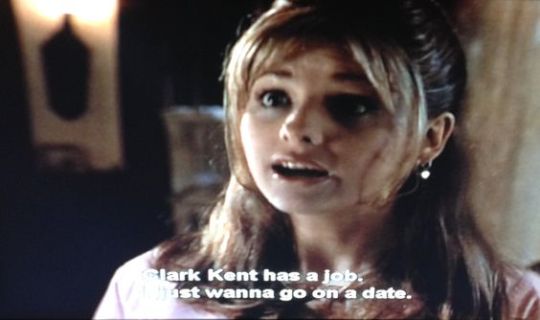
But because it’s Buffy she’s still cool and the boys likes her slaying ability best and she has the agency because she makes the decision not to date him.
Hooray!
Outfit 1
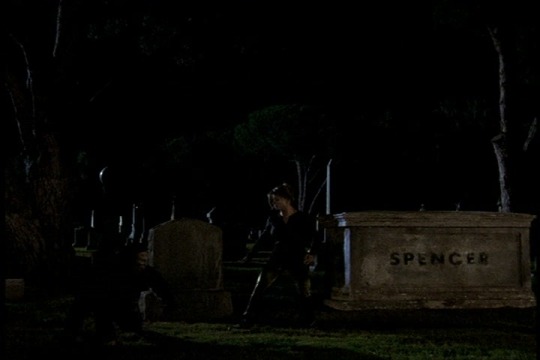
Buffy often chooses practicality AND fashion for slayage. Here we get a nice, long-sleeved top, pants and boots. Even at this point, she sort of knows what she is about, son.
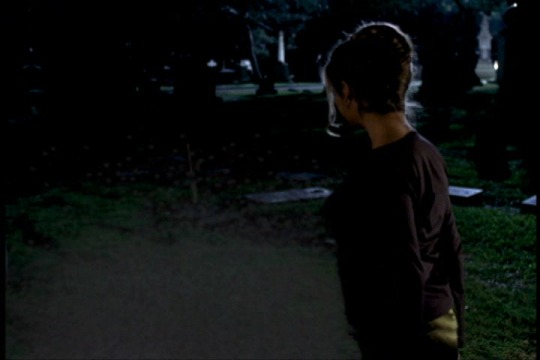
Is the top navy? Or more purple? I can’t tell. Maybe it’s because I was recently told by an optometrist that one of my pupils is bigger than the other. Ok, so that’s not really relevant. I just wanted y’all to know that I kind of have a Bowie Eye.
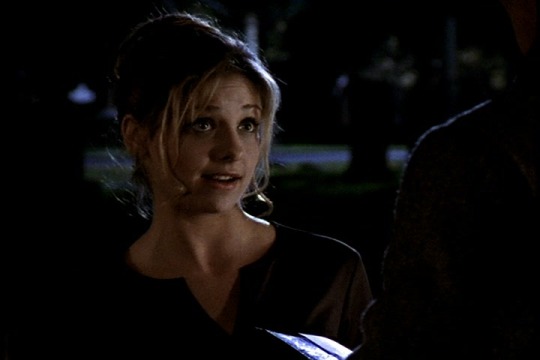
Whatever colour it is, it’s nice. But it’s not setting my world on fire like some of the other outfits in this episode will.
The ring Giles finds is super cute. Kind of reminds me of this jewellery store near where I lived as a kid called Krakatoa. Sold beads, lots of silver jewellery and incense. Similar to Tree of Life, which I love.
Outfit 2
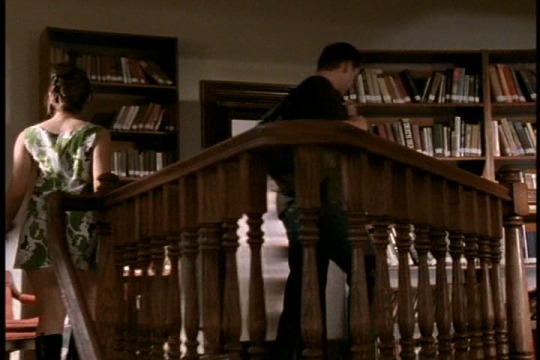
YAS GURL.
I love this dress. I remember picking up a dress in a similar pattern at an op shop once and for whatever reason I cut it up into a top and skirt. I don’t think I have it anymore and I no longer know why. Oh, that’s right, because I’m a GD FOOL.
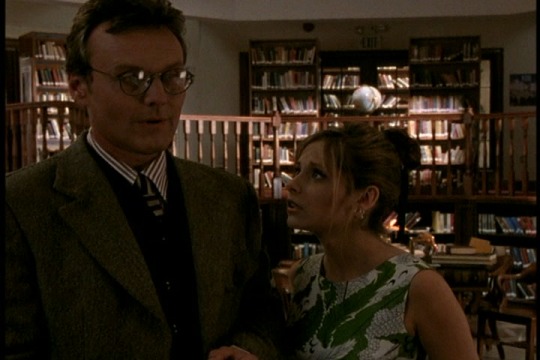
The ribbon in the bun is a cute touch. But already Buffy is trying to act like someone she thinks Owen, this episode’s paramour, wants her to be. As a teen I was like, of course! He’s Owen! He’s a boy! But now I’m like, tell him to get fucked, B. Be your own person. And guess who turns out to be right? Me. Sort of. Let’s move on!
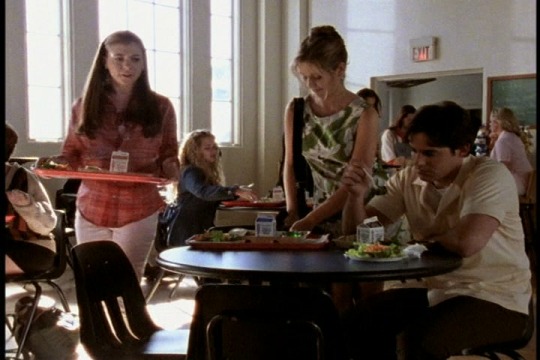
Oh, Willow. Why, gurl? You know how I feel about white pants.
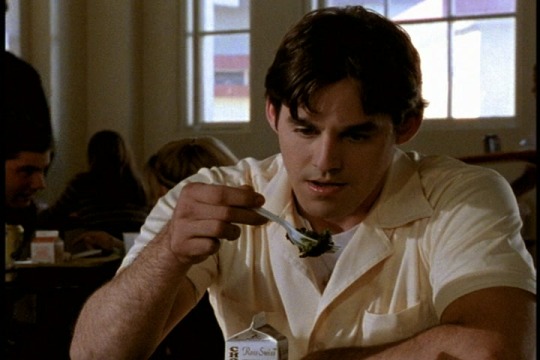
I might actually like Xander’s shirt. As a teen I think I had a bit of a crush on him in the same way I always found Chandler to be the most dateable Friend. You know, the superficially attainable dudes who if they existed would be obsessed with other women and be real jerks to you.
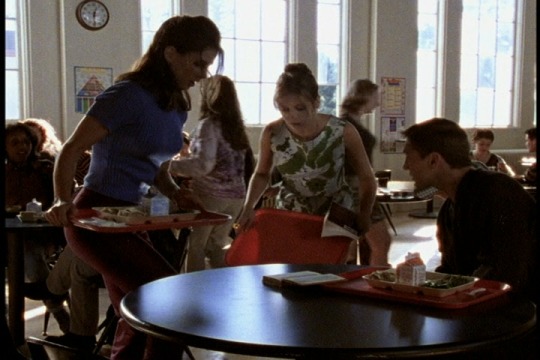
Cordelia cannot compete with Buffy in the fashion stakes and I think Owen knows it, too. But also Buffy body shames Cordelia in order to impress a boy and it makes me a bit sick. I know Cordelia’s mean, but come on. Out of order, B.
Part 1 of Is Owen just Blonde Angel?
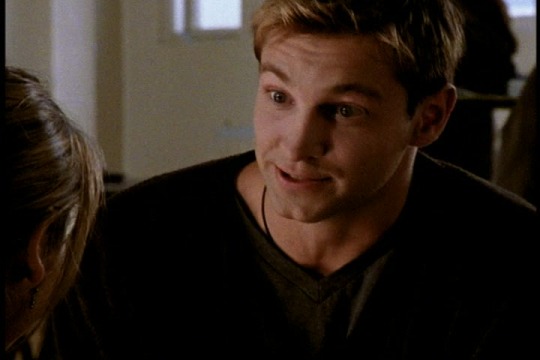
Buffy, I think you’re kidding yourself. gurl.
Outfit 2
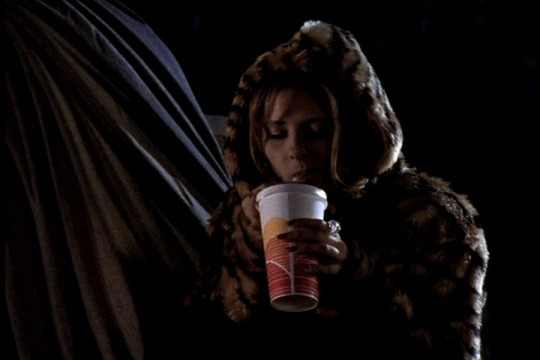
I’LL NEVER STOP LOOKING FOR A JACKET LIKE THIS. Ever.
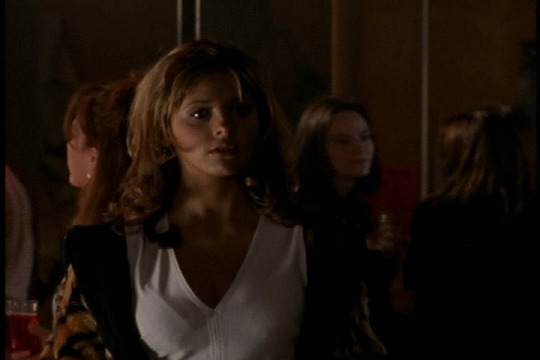
I have no idea if she was always dressed for potential Bronze-ing. Previous experience would say yes. Girl knows how to slay and party. It’s the ultimate Slay.
Outfit 4
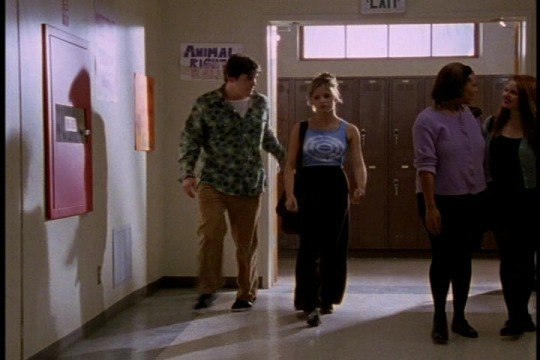
I don’t remember if teen me loved this outfit. But old me wears this outfit to work.
Part 2 of Is Owen just blonde Angel?
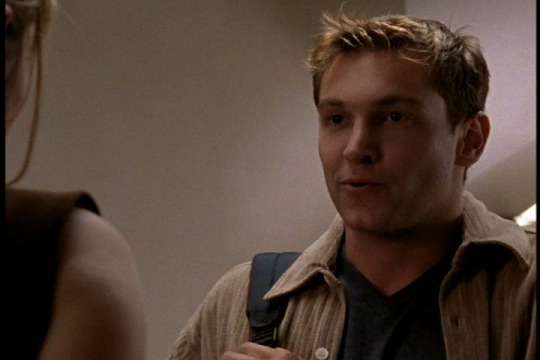
No, but really.
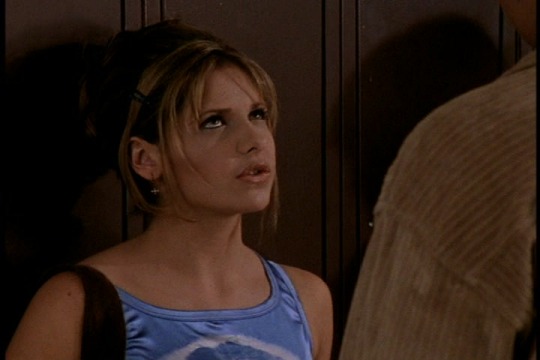
Every couple of episodes we take a break from the Big Bad of the season but now the Master is back and is wearing what appears to be a leather Nehru jacket. Could he be taking style cues from Dr Evil?
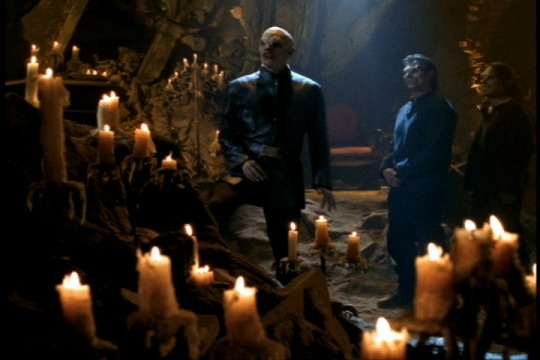
I believe the Master is doing what a friend calls ‘Peacocking.’
Outfit 5
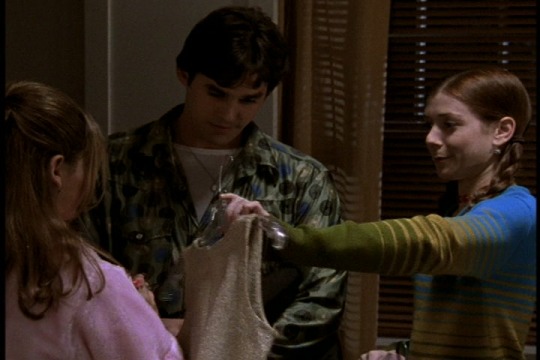
Buffy is taking advice from Xander on dressing for a dude and he’s sabotaging her by effectively slut shaming her. Like you should take advice from someone wearing that shirt.
Thank Miley for Willow. And those cute plaits.
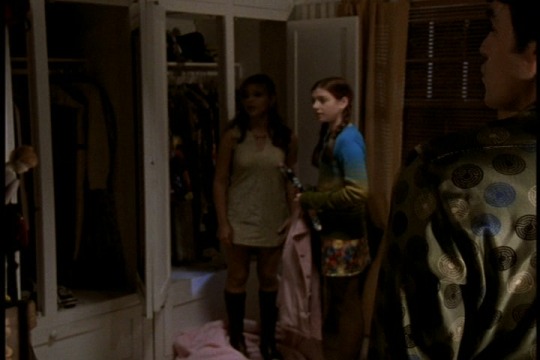
Yas to the gold. Very 60s. Her hair clip also seems to match the clasp on her dress, which is...
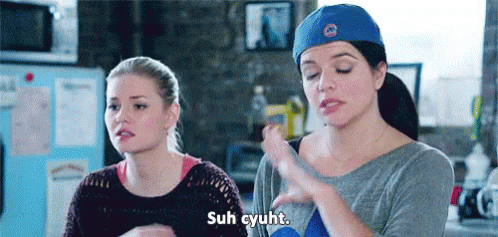
Part 3 of Is Owen just Blonde Angel?
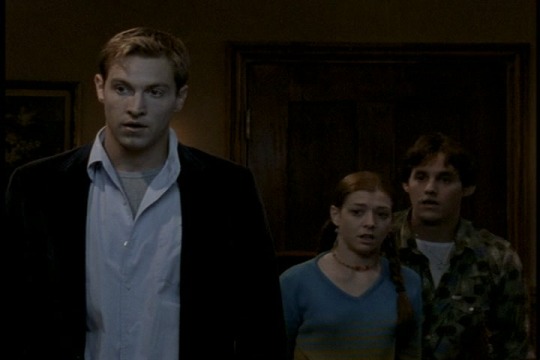
Like, dude.
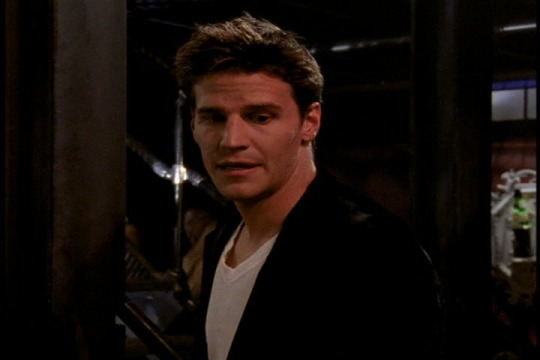
Oh, but actually, turns out, he’s not just blonde Angel. He basically tells Buffy, ‘you’re not like other girls.’ What BS. And Buffy plays into it, which is one thing she never has to do with Angel. He tells her it’s like she’s two people and she actually - SHE ACTUALLY SAYS, ‘which one do you like better?’
What she should have said was, I’m just the one person, actually. Because like all human beings young women are allowed to be multifaceted. For example, just because I like meeting people of the gender to which I’m attracted doesn’t make me less intelligent or unable to care about other things. Maybe your head, Owen, isn’t stuck in a book so much as it is up your own arse.
I’m sure the now (estimated) 35 year old Buffy would say the same thing. Actually 16 year old Buffy would probably say that. 16 year old Buffy knows better than anyone that love can be cruel.
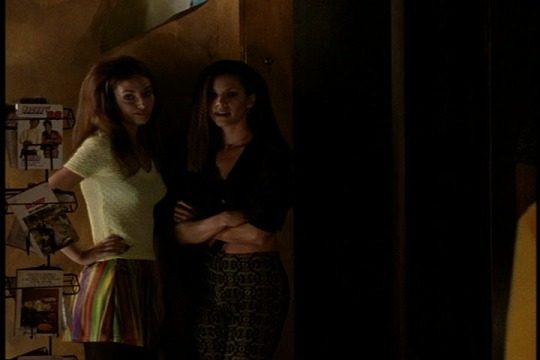
Cordelia’s crimping and not in the good way. She’s totally owning her own sexuality but shaming Buffy for trying to do the same. I know you’re mean, but come on. I feel like society trains us to believe this sort of behaviour is good or based on scientific fact - competing for other people romantically like humans are literal prizes to be won. Like a meat tray you might try to win at a raffle at your local RSL. It’s trying to apply a strategy to obtain something, but it’s something that the getting of which is largely out of your control. But maybe I’m bitter. I never win raffles.
The outfit is good, though.
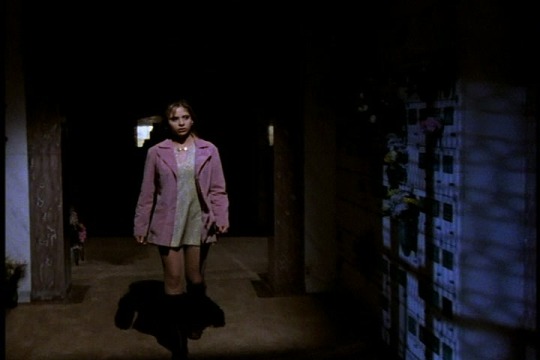
I have mixed feels about the jacket with this dress. I had a similar one I purchased, nay Lay-Buyed, from Just Jeans. I wore mine with t-shirts, jeans and you guessed it - Adidas Superstars.
So anyway Buffy saves the day. Owen thinks she’s a badass and wants to go on more extreme dates with her but Buffy, being a mother fudging superhero, understands that this actually isn’t a good idea for Owen or the Scooby Gang and breaks it off because she literally breaks vampires’ hearts, which sometimes means she has to metaphorically break humans’ hearts. She’s the Slayer, bitch.
Outfit 6
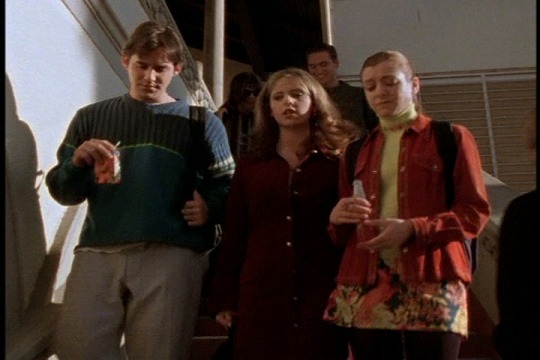
She does the metaphorical heart breaking in this jazzy little number. We don’t really see the dress underneath. It looks to be white and floral. I’m sure it was cute. Willow, Willow, Willow. Y Tho?
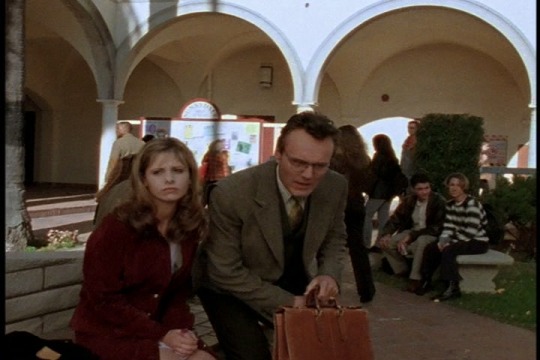
Giles is about to serve some actually useful truth nuggets and look sexy as ferk while doing it.
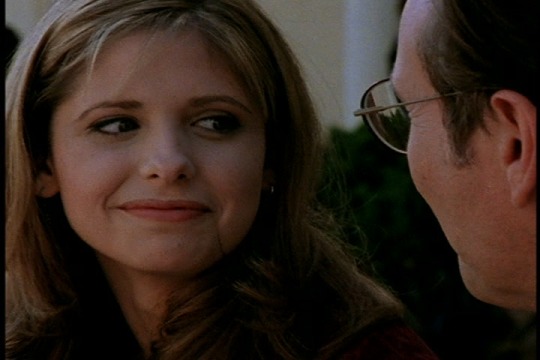
The hair is subdued like Buffy’s mood. It’s like it knew what was gonna go down. But her eyeliner is great, like it knew she would realise she’s not so bad at slaying after all. She stopped the Big Bad, eft eft ess.
Except she didn’t really, but it doesn’t matter because the thing she was supposed to stop is actually this entirely useless character:
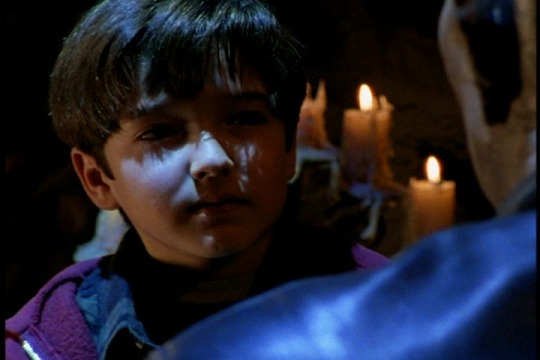
Dresses better than Xander, though.
Up next on the blog we have animals, dodgeball and the cannibalisation of School Figureheads. You may also receive a treat to celebrate the 20th anniversary of Buffy’s premiere in the US.
Until next time, Slayerettes.
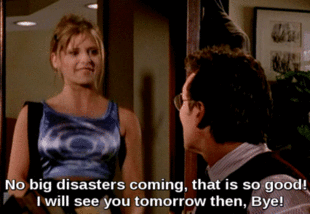
#what buffy wore#Buffy style#buffy fashion#buffy#buffy the vampire slayer#Buffyverse#buffy summers#willow rosenberg#xander harris#rupert giles#angel#cordelia chase#blog#fashion#style#pop culture#popular culture#joss whedon#whedonverse#whedonverse women#television
5 notes
·
View notes